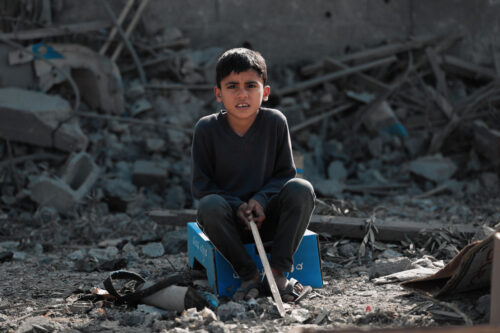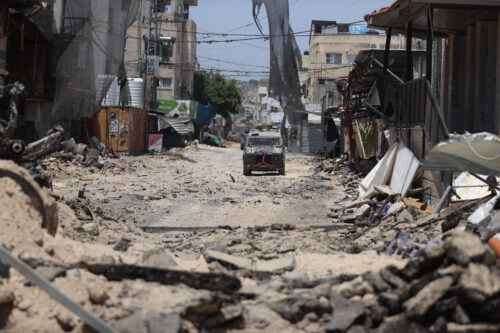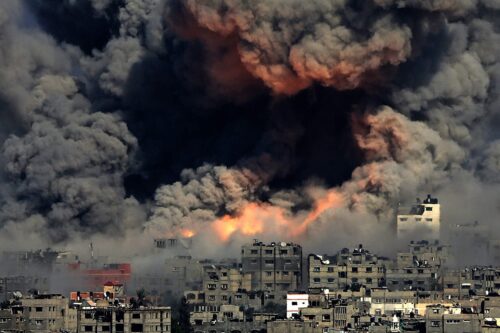Butterfly Bullets and Hospital Beds: Meeting injured Palestinians in Turkey

Since March 30, thousands of Palestinians in the besieged Gaza Strip have been demonstrating along the border fence against seven decades of forced displacement and the continued Israeli-imposed blockade that has devastated lives for more than ten years. Since the protests began, more than 140 Palestinians have been killed and at least 16,000 wounded, leading to widespread condemnation of Israel’s use of lethal force against protestors and calls for Israel to be investigated for war crimes.
On July 18, an Interpal-led delegation travelled to Istanbul to hear the accounts of some of the 43 injured Palestinian protestors who were granted exit visas to receive treatment in Turkey with the help of Medics International. Their accounts shed light on the devastating impact that the siege is having on Gaza’s health sector, as well as the new set of difficulties that come with receiving long-term treatment outside of Gaza.
A difficult journey
Israel’s indiscriminate use of tear gas canisters and live ammunition against thousands of protesters, including the so-called “butterfly bullet”, which explodes on impact to cause maximum bodily damage, is leaving Gaza’s already dilapidated health sector struggling to cope. Hospitals do not have the capacity, medical supplies or man-power to treat the wounded, leaving at-risk patients with the notoriously difficult task of applying for treatment outside of the Gaza Strip. Between March 30 and June 3, for example, more than half of patients injured during the protests were denied exit via the Rafah border crossing.
20-year-old Deah, from Jabaliya, was one of the injured protestors- and in fact the first- to be allowed out of Gaza via the Rafah border crossing to receive treatment in Turkey. He was due to be married after Eid ul-Fitr, but was instead shot in the leg by an Israeli sniper during a demonstration. The bullet caused so much damage to the muscle and bone that his leg below the knee had to be amputated as soon as he arrived at the hospital in Turkey.

20-year-old Deah, from Jabaliya
Deah hadn’t noticed he was shot at first- he was busy dragging the body of a friend away from the protest site after witnessing him being shot in the head. He had then begun to help other people that had been shot when he noticed he was bleeding. He was first taken to Gaza’s Al Shifa hospital where a German delegation of doctors were able to stop the bleeding. After his application to leave Gaza for further treatment in Turkey was accepted, he was forced to wait for three days in Arish, a border city in Egypt, where gangrene began to develop in his injured leg. Deah’s leg was amputated in Turkey, and when we met him, he was at the vending machine with his crutches and keen to keep mobile, despite still being in recovery. Deah was both articulate and composed. He was keen for people to know what he witnessed and had gone through and that he would overcome it.
Deliberate targeting
During the height of the violence, rights groups on the ground in Gaza as well as Pierre Krahenbuhl, head of the United Nations Relief and Works Agency for Palestine Refugees (UNRWA) indicated that Israel had been intentionally targeting unarmed Palestinian protestors along the Gaza border to either kill or maim, with Israeli snipers aiming for protestors’ lower limbs, knees, backs and heads.

24-year-old Mahmoud, from Deir al Balah
24-year-old Mahmoud, from Deir al Balah, was a promising footballer when he was shot and injured during the first Friday protest on March 30. He had been videoing himself at the time, with Israeli snipers visible in the distance. Mahmoud has kept the footage as his evidence that the Israeli snipers deliberately targeted him with no provocation. He had been shot in both legs, one by a “butterfly bullet”, and was left without adequate treatment for two months in Gaza before arriving in Turkey.
His footballing hopes dashed, Mahmoud is awaiting further treatment in Turkey and a complicated operation, but as with many Palestinians injured during the demonstrations, Mahmoud will be left with life-long disability and in need of ongoing care.
Hospitals on the brink
More than a third of all essential medicines and medical disposables are currently at zero stock levels across Gaza- that’s less than one month’s supply available for patients across all hospitals and healthcare clinics in the Gaza Strip. The health sector is at breaking point, and the lives of protestors- with what are in many cases treatable injuries- are under threat.
To cope with the lack of medical supplies, hospitals are forced to use outdated equipment or re-use surgical tools. Almost 50% of Gaza’s medical equipment is outdated and the average wait for spare parts can be up to six months. This puts patients at an increased risk of experiencing complications from their injuries either during surgical procedures or while they wait for treatment.
25-year-old Shaadi from Jabaliya experienced complications from his injuries after being shot in the leg by an Israeli sniper as he demonstrated along the border. The “butterfly bullet” exploded inside his lower leg, but lack of resources at the hospital in Gaza meant that doctors were only able to stop the bleeding, and amputation was considered as a last resort.
Shadi how now been receiving treatment in Turkey for two months, and despite being in intensive care for a week, he is doing better. He still has severe pain in his leg after parts of it were removed and he will remain in hospital for the foreseeable future to avoid the risk of infection to his leg.

Abdurrahman from Khan Younis
Abdurrahman from Khan Younis is just 17 years old and another protest victim affected by Gaza’s crippling health system. During a demonstration, he was shot in the chest by an Israeli sniper causing his lung to collapse and severed vertebrae. The hospital in Gaza could only treat the lung puncture but do very little for his spinal injury.
Now paralyzed from the waist down, Abdurrahman will need an electric scooter once he is back in Gaza, and will be one of the thousands of victims facing a life-time of disability in a place with little to no adequate health care available. Interpal will be working to support young people like Aburrahman both in Turkey and Gaza. Our commitment to ensuring they have a good quality of life is stronger than ever.
As the delegation met and talked to the young Palestinian men receiving treatment, a consistent pattern emerged; most of them told us that they were deliberately targeted and were shot with a “butterfly bullet”, most of them were forced to suffer through the pain of their injuries while waiting for treatment and none of the hospitals in Gaza can cope with complexity of the wounds inflicted on protestors. There is a need to address and end the violence facing the people of Gaza and that violence includes the inhumane siege. Humanitarian efforts needs to ensure Palestinians are being looked after, but their rights also need to be protected by the international community.
Despite a traumatic few months, and a lifetime of disability ahead, the young men managed to greet us warmly, share a joke and show remarkable strength and positivity. It was a privilege to speak with them and we will do what they urged us to; support the human rights of the Palestinian people.
Calculate your Zakat
Confused about how to calculate your Zakat? Try our simple-to-use calculator





